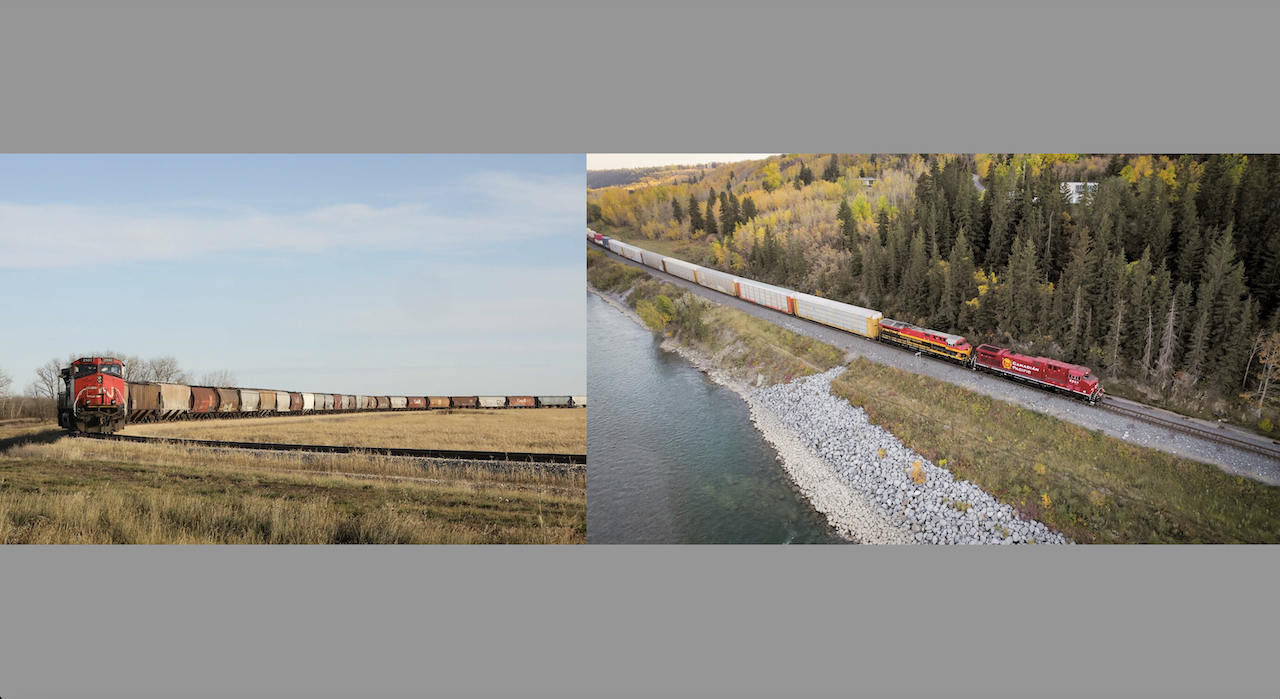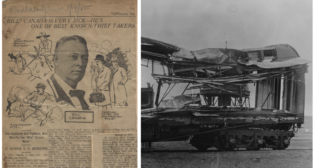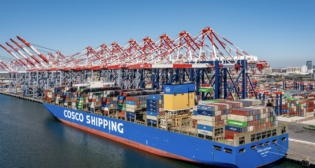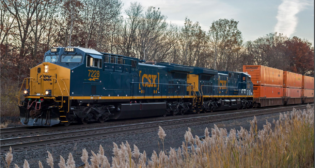
USW Ratifies New Collective Agreement; Teamsters Vote to Authorize Strikes (UPDATED, 5/3)
Written by Carolina Worrell, Senior Editor
Photos Courtesy of Pascale Simard/Alpha Presse (left) and CPKC (right).
The United Steelworkers (USW) Local 2004 ratifies a new three-year collective agreement with CN. Meanwhile, the Teamsters Canada Rail Conference (TCRC) votes to authorize strikes at CN and Canadian Pacific Kansas City (CPKC).
CN announced May 1 that its new three-year collective agreement with USW Local 2004, which represents approximately 2,500 track and bridge employees at the Class I, has been formally ratified by union members on Monday, April 29.
The new three-year agreement, which expires on Dec. 31, 2026, includes wage increases each year, enhancements to eligible expense reimbursements and improved medical, dental and healthcare benefits with a transition to the CN Unionized Flex Benefit Plan in 2025. The ratified agreement also includes “measures to increase productivity and reduce the need to outsource work to contractors by creating new positions within the company and allowing more workers to move outside their region when needed,” according to CN.
“We’re pleased to have reached this new collective agreement through collaborative negotiations,” said CN Executive Vice-President and Chief Networking Operating Officer Patrick Whitehead. “It is a testament to our commitment to invest in our people, contributing to a more productive environment with more opportunities to grow within the organization.”
In related news, TCRC on May 1 announced that close to 10,000 workers at CN and CPKC have voted to authorize a strike as early as May 22 unless parties can reach an agreement.
At CN, conductors, locomotive engineers and yard workers have voted 97.6% to authorize a strike, with a 93.3% turnout. At CPKC, conductors, locomotive engineers and yard workers have voted 99% to authorize a strike, with a 91.7% turnout. And rail traffic controllers (RTCs) at CPKC have voted 95.3% to authorize a strike, with a 96.6% turnout, according to the union.
“After six months of negotiations with both companies, we are no closer to reaching a settlement than when we first began,” said TCRC President Paul Boucher. “Both companies are trying to strip our collective agreements of safety-critical rest provisions. We are at an impasse, with the companies failing to understand that the Teamsters will never compromise on safety or bargain with Canadian lives.
“A simultaneous work stoppage at both CN and CPKC would disrupt supply chains on a scale Canada has likely never experienced. I would like to make it very clear that provoking a crisis on that scale has not been, and never will be, our goal. The reality is that we would very much like to avoid a work stoppage. With these results, we intend to go back to the bargaining table, work with federal mediators, and do everything in our power to reach a fair deal for our members. A deal that does not compromise on safety—or put profits over people,” added Boucher.
According to CN, negotiations between CN and the TCRC, which represents approximately 6,000 conductors, conductor trainees, yard coordinators and locomotive engineers across CN’s network in Canada, are ongoing, with meetings held between the parties on April 29 and 30, supported by federal conciliators. The collective agreement between TCRC and CN expired on Dec. 31, 2023, and will be extended under Canadian law until the parties can reach an agreement.
“The union has made it clear that it will not agree to move toward a more modern agreement based on an hourly rate and scheduling that would have provided significant wage increases and offered scheduled consecutive days off, provisions for no layoffs, and reduced hours away from home,” CN said.
In an effort to reach a negotiated agreement, CN suggested “a simplified, alternative path to achieve a deal prior to the earliest possible deadline of a strike on May 22.” CN says its suggestion “was designed to protect the Canadian supply chain, the North American economy and, equally importantly, ensure employees get a fair deal.”
“Ultimately, despite five months of consistent discussions, the TCRC has made very few concessions towards a negotiated agreement and has been unclear on what it is seeking for employees other than to continue focusing on a list of approximately 200 local and regional demands unrelated to a modern consolidated agreement benefiting employees and customers alike,” the Class I said.
In addition, the union is unavailable to meet until May 13. “CN has been and remains working hard to reach a negotiated mutually beneficial agreement with the TCRC. Regrettably, CN maintains a cautious outlook regarding possibility of finalizing a deal before a labour disruption that would affect the Canadian supply chain, the North American economy and our employees,” the Class I added.
With the assistance of federal conciliators, CPKC and TCRC leadership are meeting again this week to continue negotiations to renew the collective agreements for both the Class I’s Train and Engine (T&E) and RTC employees. “Unfortunately, despite our best efforts, the parties remain far apart,” CPKC said.
Under the Canada Labour Code, April 30 was the last day of the 60-day conciliation period. The parties now begin a mandatory 21-day period of mediation with federal mediators. If the parties do not reach new collective agreements during the mediation period, a legal work stoppage could occur as early as Wednesday, May 22. The Canada Labour Code requires a minimum of 72-hours notice prior to a strike or lockout.
“A work stoppage will impact all Canadians. It will halt freight traffic on CPKC’s Canadian rail network. It would disrupt essential supply chains throughout North America, and significantly constrain trade between Canada and the U.S. and Mexico. Commuter services hosted on CPKC’s network in Montreal (Exo), Toronto (Metrolinx), and Vancouver (West Coast Express) will be unable to operate,” the Class said.
“CPKC does not want a work stoppage. We remain focused on, and dedicated to, reaching balanced, responsible agreements through the collective bargaining process. CPKC is committed to negotiating in good faith and responding to our employees’ desire for higher pay and improved work-life balance, while respecting the best interests of all our railroaders, their families, our customers, and the North American economy,” the Class I added.
CPKC says it has made two distinct offers to the TCRC leadership. “Both options provide significant benefits for our employees and fully comply with new Canadian regulatory requirements for rest. They do not in any way compromise safety. To say or suggest otherwise is false. The first offer provides significant pay increases made possible by a simplified time-based method of pay and improved work-life balance through schedule predictability and set days off. The second offer proposes competitive wage increases and maintains the status quo for the balance of the collective agreement, with one exception: addressing a single pay item at the away from home terminal to account for the new regulated rest regime in Canada,” CPKC said.
TCRC leadership and CPKC are meeting this week and are scheduled to meet again during the week of May 13.
Statement From Soy Transportation Coalition
“A potential strike or stoppage would only be limited to the rail networks in Canada,” said Soy Transportation Coalition Executive Director Mike Steenhook. “U.S. railroads, including the U.S. based networks of CN and CPKC, operate under a different agreement with U.S. based railroad workers. The most recent contract in the U.S. was finalized in December of 2022. However, any rail delivery originating in the U.S. and destined for Canada or originating in Canada and destined to the U.S. would be impacted by a strike or stoppage. Some U.S. agricultural exports do occur via Canadian ports. Moreover, a substantial volume of fertilizer originates in Canada and is delivered via rail to the U.S. market. Those shipments would be impacted by a strike or stoppage.
“Uncertainty and tumult are kryptonite to any functioning supply chain. Unfortunately over the past several years, we continue to experience one challenge after another that continue to impede the ability of agriculture and the broader economy to be as successful as they can be. Hopefully a strike in Canada can be avoided and the negotiations will result in an agreement that benefits both railroads and workers and restores a degree of predictability to the supply chain.”



